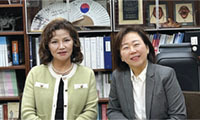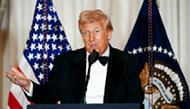Qualcomm’s Royalty Policy Angers Korean Chip Makers
Staff Reporter
U.S. chipmaker Qualcomm’s royalty policy has angered Korean manufacturers of code division multiple access (CDMA) phones as it charges lower rates to China than to Korea.
A local CDMA phone maker contends that Qualcomm gives a ``subsidy’’ to Chinese exporters as it collects as low as 5 percent of handset prices in royalties from them. But the rate is 5.75 percent for Korean makers.
Korean cell phone producers, which pay a fixed 5.75 percent for export and 5.25 percent for local sales to the San Diego-headquartered firm, shoulder higher royalty burdens in both domestic and global markets.
According to a contract between Qualcomm and one of China’s leading handset manufacturers, which The Korea Times obtained exclusively, the royalty rates are 2.65 percent for local sales and 7 percent for offshore shipments.
However, the contract says the export royalty will be cut to as low as 5 percent after the three years immediately following the license effective date.
The deduction ranges from 5 percent to 6.5 percent, depending on quarterly export volume, but the Chinese firm is entitled to enjoy the low rates ``if more than 100,000 such subscriber units (handsets) are sold in the applicable calendar (year)’’ in overseas markets.
Considering the 10-year contract was signed in early 2001, the licensee will be able to ``enjoy’’ the 5 percent royalty rate for exports from some time this year for the next seven years if the firm meets the 100,000-unit, three-month requirements.
Hwang Tae-kyung, an official from the private Information and Telecommunications Intellectual Property Association (ITIPA), the nation’s mid-tier cell phone makers’ lobby group, said such rates would be applied to all Chinese cell phone exporters.
``Because Qualcomm has a policy of setting the same royalty rates for firms of the same country, the royalty level will be identical for all Chinese companies. Also, I have a copy of a contract between Qualcomm and another Chinese company, which stipulates the same rates,’’ Hwang said.
He added because Qualcomm doled out CDMA technology usage deals with Chinese handset providers mostly in 2001, their export royalty level will fall from the middle of this year.
The royalty gaps angered Korean handset makers, which have suffered under the higher CDMA royalties which are based on not only the Qualcomm chips but the price of the entire handset, excluding only batteries and packaging.
``The discrimination really infuriates me. We have paid the high royalties, which are chipping away at our bottom line. On what grounds does Qualcomm favor China at the expense of Korea,’’ an official from a mid-size Korean cell phone maker said on the condition of anonymity.
He added Korean handset manufacturers are already enraged by Qualcomm as it collects royalties even on high-end peripherals, like cameras and sound modules, with which the company has nothing to do with.
``Qualcomm should cut the rates to those levels of China. At the same time, Korea should do all it can to be free from Qualcomm’s arbitration based on its monopolistic status,’’ the official claimed.
Korea accounts for more than half of the world’s CDMA-phone production with global leaders LG Electronics and Samsung Electronics. Each of the two companies churned out more than 20 million such handsets last year.
Studies conducted by the nation’s legislature showed last year Korean handset makers paid over 1.5 trillion won in royalties to Qualcomm since 1995.
When questioned about the royalty discrimination, Qualcomm senior director of corporate republic relations Christine Trimble said, ``Due to the confidentiality of our license agreements, we are unable to comment on the terms of the agreements.’’
The official also added: ``Qualcomm’s license agreements with some licensees require Qualcomm, under certain circumstances, to offer those licensees the terms and conditions of later license agreements signed with new licensees. Qualcomm has fully abided by its most favored obligations.’’
ITIPA’s Hwang said, however, Qualcomm did abide by its obligations but at the same time the shrewd outfit found out a way to present favorable royalty rates to Chinese makers, while muting Korea’s opposition, with the staged system.
``Surely in 2001, Qualcomm asked whether Korean companies would switch royalty rates to those of China in accordance with the most-favored-obligations clause with Korean companies.
``But our large-volume cell phone exporters can’t endure an additional (royalty) burden of 1.25 percent for three years. If our industry was in the nascent stage, of course, we would have accepted it,’’ Hwang said.
Hwang added that for Chinese makers 7 percent royalty rates were not a big deal in 2001, because the CDMA phone start-ups weren’t able to focus on exports during the first three years of operation and that afterwards the rates will go down to 5 percent for large-volume exporters.
voc200@koreatimes.co.kr
스마터리빙
more [ 건강]
[ 건강]이제 혈관 건강도 챙기자!
[현대해운]우리 눈에 보이지 않기 때문에 혈관 건강을 챙기는 것은 결코 쉽지 않은데요. 여러분은 혈관 건강을 유지하기 위해 어떤 노력을 하시나요?
 [ 건강]
[ 건강]내 몸이 건강해지는 과일궁합
 [ 라이프]
[ 라이프]벌레야 물럿거라! 천연 해충제 만들기
 [ 건강]
[ 건강]혈압 낮추는데 좋은 식품
[현대해운]혈관 건강은 주로 노화가 진행되면서 지켜야 할 문제라고 인식되어 왔습니다. 최근 생활 패턴과 식생활의 변화로 혈관의 노화 진행이 빨라지고
사람·사람들
more
“창의력과 한국어 표현력 길러요”
남가주한국학원(이사장 박성수·교육감 신춘상)이 오는 6일(토) 오전 10시, 산하 11개 지역 학교에서 ‘제1회 글짓기 대회’를 개최한다. 학…

라크마 필하모닉 오케스트라&코랄… ‘크리스마스 패밀리나잇’ 콘서트
라크마(LAKMA) 필하모닉 오케스트라 & 코랄이 한 해를 마무리하는 따뜻한 크리스마스 음악 선물을 준비했다. 비영리 음악단체 라크마 필하모닉…
SMG, 자선 골프토너먼트 성황… 유스타재단에 3… 1
서울메디칼그룹(SMG)은 지난 4일 뉴포트비치 펠리칸힐 골프코스에서 ‘2025 자선 골프토너먼트’를 성황리에 개최했다. 이번 행사에는 내년 1…
LA 체육인의 밤 송년행사
LA 체육회가 주최한 체육인의 밤 송년행사가 지난 3일 LA 가든스윗 호텔에서 성황리에 열렸다. 이날 행사에는 각 가맹 종목 협회 회원들이 참…
‘다리 어워드’ 20주년 시상식
한국 문화체육관광부와 한국콘텐츠진흥원이 개최하는 2025 다리 어워드 20주년 시상식이 4일 오후 6시30분부터 LA 코리아센터에서 열린다.다…
많이 본 기사
- 맘다니 뉴욕시장 당선인 “이민자들, 단속 거부 권리 있다”
- 사법개혁 파고 속 법관대표회의 개회…내란재판부 의견 나올까
- “통일교, 민주당도 지원” 증언 파장…특검 ‘선택적 수사’ 지적도
- 구금된 백악관 대변인 전 올케, 백악관 설명에 “역겨운 거짓”
- 쿠팡 美본사 상대로 집단소송 추진된다… “징벌적 손배소송”
- 마크롱, 中국빈방문 뒤 대중관세 부과 경고… “유럽 무역적자 심각”
- 올해 마지막 FOMC…경제학자들도 “미 금리인하” 전망
- 트럼프, 넷플릭스의 워너 인수에 “절차거쳐야…점유율 너무커”
- ‘빚’ 없이 졸업 가능… ‘무대출’ 정책 대학이란
- 조영남, 세번째 결혼 욕심 ..28세 연하 방송인에 공개 프러포즈
- 베선트 재무장관, 2천500만 달러 ‘대두·옥수수’ 농장 지분 처분
- 美 ‘히트메이커’ 시상식서 로제· ‘케데헌’ 가수들 수상
- 많이? 아니면 깊이 있게?… 대학, 과외활동 평가 방식
- 딘딘, ‘조폭연루설’ 조세호에 뼈 있는 한마디..”출연료 낮춰야”
- 전국법원장회의 이어 법관대표회의… ‘사법개혁’ 의견 나올까
- 박미선, 항암 투병기 공개하는 이유 “몇 분이라도 힘내셨으면”
- 트럼프, 상호관세 ‘여론전’… “강력·신속, 다른 나라 불평없어”
- 조세호·박나래 논란 일파만파..해명에도 하차 요구, 청원까지 등장
- 인플레 여론 심상치 않다는데…트럼프, 경제 메시지 톤 바꿀까
- 비록 SON과 맞대결 불발됐지만... “아름다운 순간” GOAT 메시 美 정복! ‘MLS컵 우승+MVP’
- 장갑 끼고 트로피 든 월드컵 우승 감독…FIFA 회장 공개 사과
- ‘풀타임 맹활약’ 김민재 남다른 위력, 뮌헨 ‘7경기 만에 무실점’ 대승... ‘패스 92%’ 무결점 플레이
- 러, 트럼프 국가안보전략에 “우리 비전과 여러모로 부합” 환영
- 머스크 “EU 해체하라”…엑스 과징금에 연일 설전
- 케네디 주니어 보건장관과 부적절 관계 의혹 대중지 편집자 사임
- 트럼프, 사면한 野의원 민주당으로 재… 1
- 최측근그룹이 좌우하는 트럼프 외교정책… “결정 빠르나 위험하다”
- 글로벌운용사들 ‘AI 거품’ 우려속 “내년에도 증시 랠리” 전망
- 유력매체 쫓겨난 펜타곤 기자실에 트럼프 강성지지자 가득
- 특검, ‘계엄때 국힘 원내대표’ 추경호 기소… “헌법책무 저버려”
- 헤그세스 국방 “韓같은 모범동맹에 특혜…자기역할 못하는 동맹엔 후과”
- 제이미슨 그리어 무역대표, 對中 첨단 반도체 수출통제에 “항상 유동적”
- 위성락 “남북대화 재개 추진…연합훈련, 카드로 직접 고려 안해”
- 베선트 재무장관 “올해 美실질 GDP성장률 3%…내년 인플레 하락 전망”
- 랜도 국무부 부장관, EU에 “비선출 권력이 문명의 자살 추구” 비난
- 중·러에 압박수위 낮춘 트럼프의 국가안보전략…러 “긍정적”
- 내 나이 39살, SON과 함께 2년 더 뛸래... 베테랑 요리스, LA FC와 1+1년 재계약
- 국민정보 해외유출 공포…C커머스·G마… 1
- ‘사기·우울증’ 겪은 자두.. “♥목사 남편, 엉망이던 나 다시 그려줘”
- “이제 진짜 승부가 남았다” 배용준, PGA투어 Q스쿨 최종전 진출... 노승열도 공동 4위 통과
- 업비트 54분만에 코인 1천억개 털렸는데…해킹 제재 피하나
- 남아공 호스텔서 총기 난사…어린이 포함 12명 사망
- 홍명보호 월드컵 조별리그 경기, 한국시간 오전 10∼11시 시작
- BTS RM “해체·중단도 생각했지만…잘 준비해 보여드리겠다”
- 조진웅, 연예계 은퇴 “배우 생활 마… 2
- 트럼프 “미국도 축구 ‘풋볼’로 부르… 1
- 헤그세스 국방 “韓같은 모범동맹에 특혜…자기역할 못하는 동맹엔 후과”
- ‘솔로 20년차’ 김장훈 “생활고 NO, 母에 해명하려 600만원 지출”
- 홍명보호 결전지 어떤 곳…항일운동 흔적·韓기업 대거 밀집
- “구글 추격에 ‘코드레드 발령’ 오픈AI, 챗GPT 업데이트 앞당겨”
1/5지식톡

-
 테슬라 자동차 시트커버 장착
0
테슬라 자동차 시트커버 장착
0테슬라 시트커버, 사놓고 아직 못 씌우셨죠?장착이 생각보다 쉽지 않습니다.20년 경력 전문가에게 맡기세요 — 깔끔하고 딱 맞게 장착해드립니다!장착비용:앞좌석: $40뒷좌석: $60앞·뒷좌석 …
-
 식당용 부탄가스
0
식당용 부탄가스
0식당용 부탄가스 홀세일 합니다 로스앤젤레스 다운타운 픽업 가능 안녕 하세요?강아지 & 고양이 모든 애완동물 / 반려동물 식품 & 모든 애완동물/반려동물 관련 제품들 전문적으로 홀세일/취급하는 회사 입니다 100% …
-
 ACSL 국제 컴퓨터 과학 대회, …
0
ACSL 국제 컴퓨터 과학 대회, …
0웹사이트 : www.eduspot.co.kr 카카오톡 상담하기 : https://pf.kakao.com/_BEQWxb블로그 : https://blog.naver.com/eduspotmain안녕하세요, 에듀스팟입니다…
-
 바디프렌드 안마의자 창고 리퍼브 세…
0
바디프렌드 안마의자 창고 리퍼브 세…
0거의 새제품급 리퍼브 안마의자 대방출 한다고 합니다!8월 23일(토)…24일(일) 단 이틀!특가 판매가Famille: $500 ~ $1,000Falcon: $1,500 ~ $2,500픽업 & 배송직접 픽업 가능LA…
-
 바디프렌드 안마의자 창고 리퍼브 세…
0
바디프렌드 안마의자 창고 리퍼브 세…
0거의 새제품급 리퍼브 안마의자 대방출 한다고 합니다!8월 23일(토)…24일(일) 단 이틀!특가 판매가Famille: $500 ~ $1,000Falcon: $1,500 ~ $2,500픽업 & 배송직접 픽업 가능LA…
케이타운 1번가
오늘의 1면
오피니언

‘배타적 시민권 법안’ 주시하고 대처해야

올 연말, 음주운전만은 피하자
 손영아 문화 칼럼니스트·YASMA7 대표
손영아 문화 칼럼니스트·YASMA7 대표 [손영아 문화산책] 두다멜 이후의 LA필, 새로운 스타를 향한 긴 탐색
 마크 A. 시쎈 / 워싱턴포스트 칼럼니스트
마크 A. 시쎈 / 워싱턴포스트 칼럼니스트 [마크 A. 시쎈 칼럼] 트럼프의 ‘마약선 타격’ 각본은 오바마가 썼다
 전병두 서북미수필가협회 회원
전병두 서북미수필가협회 회원 [금요단상] 인연
 민병권 / 서울경제 기자
민병권 / 서울경제 기자 [만화경] ‘분산에너지’의 본말전도

[왈가 왈부] 여 “내란재판부 연내 처리”… 후폭풍 감당할 자신 있나요
 이상희 UC 리버사이드 교수 인류학
이상희 UC 리버사이드 교수 인류학 저속 인생
 클라라 원 대한인국민회 기념재단 이사장
클라라 원 대한인국민회 기념재단 이사장 [기고] 중가주 사적지 역사탐방을 마치고
1/3지사별 뉴스

라커펠러 센터 크리스마스 트리 불 밝혀
맨하탄 라커펠러 센터의 대형 크리스마스트리 점등식이 3일 화려하게 펼쳐졌다. 5만여 개의 형형색색 LED 전구와 스와로브스키 크리스탈 별 장식…
H-1B심사 ‘검열(표현의 자유) 이력자’ 걸러낸다
연말‘산타 사기’ 조심하세요!
크리스마스를 앞두고 ‘산타 사기’(Santa Frauds)로 불리는 범죄가 기승을 부리고 있다.소비자보호단체(Better Business Bu…
송수 박사 초청‘치매’ 특강…포토맥 포럼, 11일

헤그세스 국방 “韓같은 모범동맹에 특혜…자기역할 못하는 동맹엔 후과”
피트 헤그세스 국방부 장관은 6일 한국처럼 자기방어를 더 책임지는 ‘모범 동맹’에는 혜택을 주되 국방비를 늘리지 않는 동맹에는 불이익이 있을 …
북가주 지역 한인들을 위한 무료 법률 상담회

오늘 하루 이 창 열지 않음 닫기 



















































.png)


댓글 안에 당신의 성숙함도 담아 주세요.
'오늘의 한마디'는 기사에 대하여 자신의 생각을 말하고 남의 생각을 들으며 서로 다양한 의견을 나누는 공간입니다. 그러나 간혹 불건전한 내용을 올리시는 분들이 계셔서 건전한 인터넷문화 정착을 위해 아래와 같은 운영원칙을 적용합니다.
자체 모니터링을 통해 아래에 해당하는 내용이 포함된 댓글이 발견되면 예고없이 삭제 조치를 하겠습니다.
불건전한 댓글을 올리거나, 이름에 비속어 및 상대방의 불쾌감을 주는 단어를 사용, 유명인 또는 특정 일반인을 사칭하는 경우 이용에 대한 차단 제재를 받을 수 있습니다. 차단될 경우, 일주일간 댓글을 달수 없게 됩니다.
명예훼손, 개인정보 유출, 욕설 등 법률에 위반되는 댓글은 관계 법령에 의거 민형사상 처벌을 받을 수 있으니 이용에 주의를 부탁드립니다.
Close
x